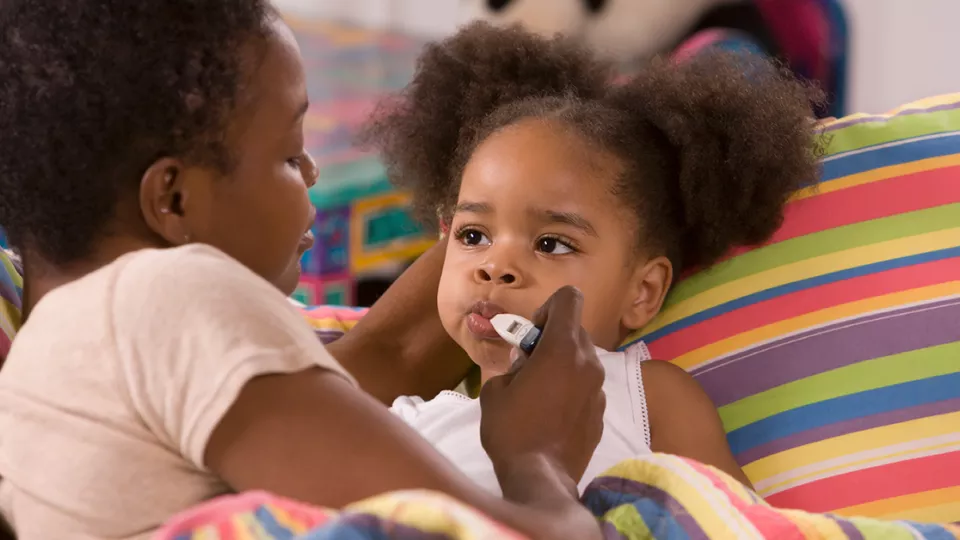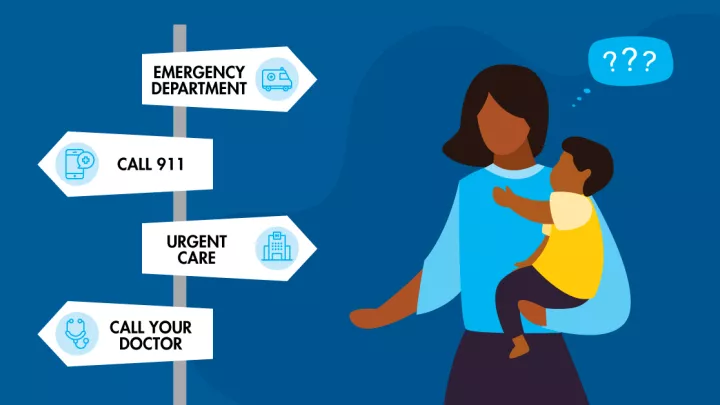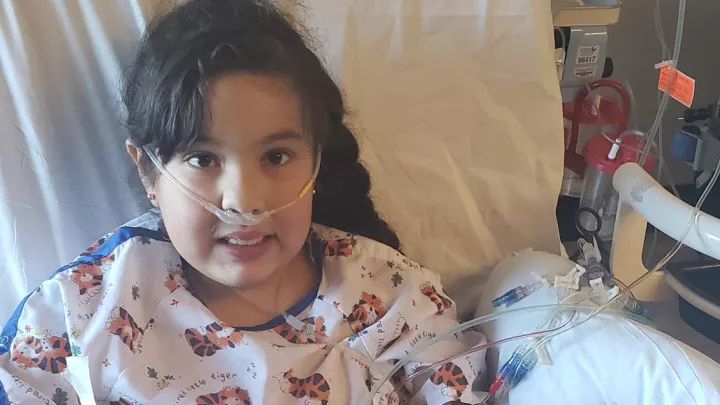
When to Call the Doctor for Your Child’s Fever
What should you do if your child has a fever? When should you call the doctor? And how is fever related to COVID-19 and a new, rare condition in kids called multisystem inflammatory syndrome in children (MIS-C)?
Christopher Tolcher, MD, FAAP, a pediatrician with Agoura-West Valley Pediatrics—part of the CHLA Health Network—shares the facts on fever and what parents need to know.
What counts as a fever?
A normal body temperature for a child ranges from 97 to 100 degrees, with an average of around 98.6 F. When a person’s temperature reaches 100.4 or above, it’s a fever.
Fever is good

Fevers are common in children. And while a fever is never fun, in most cases it’s nothing to fear. It’s part of the body’s way of fighting an infection.
“Fever helps the immune system,” Dr. Tolcher explains. “It slows down the spread of viruses and bacteria. It helps the body make more antibodies and chemicals that fight the infection, and it helps the immune system’s cells move around better in the body.”
How high is too high?
“Fevers are almost never dangerous, with the exception of ‘hyperthermia’, or a high body temperature from the body’s being unable to cool off in a very hot environment,” he says. “A fever has to reach 107 to cause damage to tissues. That’s extremely rare.”
That said, if your child’s fever reaches 105, call your doctor. “It doesn’t mean the child is in danger,” he adds, “but the child should be checked by the doctor that day to see what’s going on.”
When to call the doctor
Call your child’s doctor right away for:
- A fever that lasts more than four to five days
- A fever (over 100.4) in a newborn younger than 2 months old
- If you can’t reach your doctor, go to the emergency department.
- A fever of 105 or higher in a child of any age, including teens
- A fever in an infant (less than a year old) over 102 for more than two days—without a clear reason for the fever
If your child has a fever AND any of the following signs, call your doctor right away or go to the emergency department:
- Widespread, red or purple rash
- Stiff neck and bad headache
- Severe pain, including bad abdominal pain
- Shortness of breath
- Extreme weakness or altered mental state
- Dehydration (diapers are dry, child is not peeing much and urine is very dark)
Fever and seizures
Children under 5 can sometimes have a seizure during a fever. “Seizures are scary as heck to watch, but most of the time, you don’t need to go to the ER,” Dr. Tolcher says.
- If your child has a seizure that lasts less than two minutes, call your doctor.
- If a seizure lasts more than four to five minutes, call 911.
COVID-19, MIS-C and Kawasaki disease
- COVID-19. In children, COVID-19 symptoms can be similar to colds and flu and can include fever, runny nose and cough, and sometimes vomiting and diarrhea. If you think your child might have COVID-19, call your doctor.
- MIS-C. MIS-C is a new health condition seen in some children who have been infected with the novel coronavirus and recovered—but later had an immune response that caused high levels of inflammation in their body. The symptoms are very similar to Kawasaki disease. MIS-C and Kawasaki disease are not contagious, but can be life-threatening.
Call your doctor if your child has any fever for more than four or five days. Also call your doctor if your child has a high fever AND any of the following: cracked red lips, red tongue, red eyes, swollen hands and feet, rash, abdominal pain or enlarged lymph nodes.
“I want to reassure parents that MIS-C is rare,” he adds. “We need to watch for it, but don’t freak out.”
Tips for treating a fever
- Treat the child, not the number. “Focus on how the child is doing, not the number on the thermometer,” Dr. Tolcher says. “If the fever is 100.5, but the child is crying from a headache or earache, give a pain reliever. But if they have a 104 and aren’t that bad, just give them fluids and keep them comfortable.”
- Don’t over-bundle. Too many layers and heavy blankets will raise the fever higher—and make your child more miserable. The child should dress comfortably. Lightweight pajamas and light blankets are fine.
- Give plenty of fluids. “The body burns through water a lot faster when it has a fever, which is why extra fluids are important,” Dr. Tolcher explains. “You don’t want your child to get dehydrated.”
Tip: Watch how much your child is peeing. If your child’s urine is dark, or your child is not peeing as often as normal, give more fluids. Good options: water, clear soups, electrolyte solution or popsicles.
- Focus on comfort. “You don’t have to get the fever down to 98.6,” Dr. Tolcher says. “If a child has a 104 and a lot of body aches, giving one medicine will bring it down two or three degrees. That’s enough. You just want to make the child more comfortable.
“If you aggressively try to keep it down to 98.6, you slow the immune response to the infection,” he notes.
- Be careful with dosing medicine. Keep track of what medicine you give and when. You don’t want the child to get extra doses. And don’t exceed the dosing intervals on the medicine label. If the directions say wait six hours, wait at least six hours.
The best medicines for fever are acetaminophen (Tylenol) or ibuprofen (Advil). Never give aspirin. If COVID-19 is suspected or diagnosed, acetaminophen should be your first choice.
The bottom line? Keep your child comfortable, hydrated and at home. “We all need to rest when we’re sick,” Dr. Tolcher says. “That’s one of the benefits of fever. It slows you down and gets you to take a break.”


